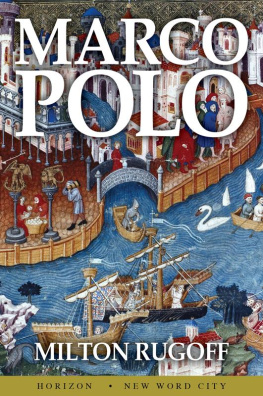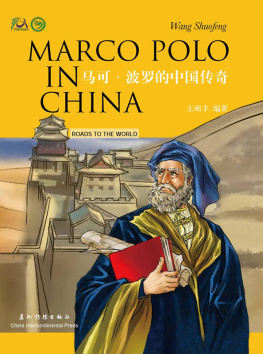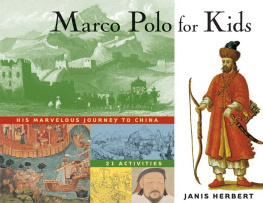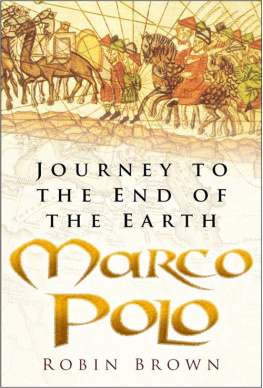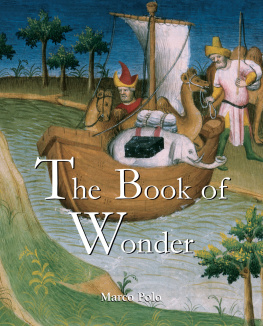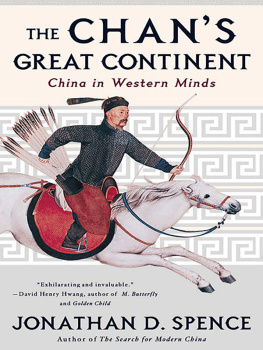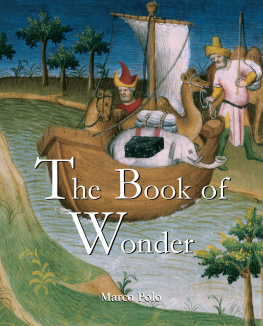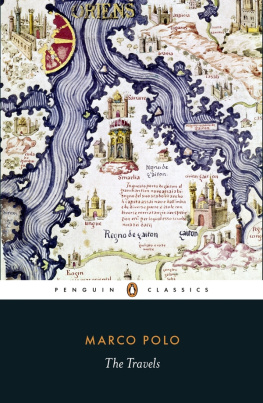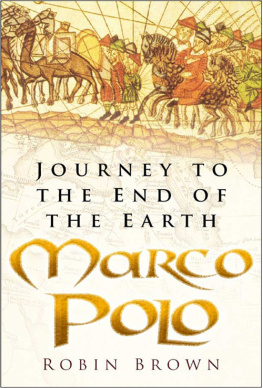Marco Polos China
Marco Polos famous book about his journey to China, written in 1298, continues to be a subject of considerable controversy. One recent work on the subject argues that Marco Polo never went to China at all, and other scholars have pointed out apparent mistakes and important omissions in Marcos writings, including his failure to mention the Great Wall, and his apparently erroneous description of the course of the Yellow River.
This book re-examines Marco Polos writings. The main arguments against his credibility have been negative, concentrating on things that it is argued he should have seen and noted but did not. The most serious of these supposed omissions are generally said to be his failure to describe the Chinese writing system, tea, foot-binding and the Great Wall of China. But the author argues that what he does mention is impressive and argues strongly for his veracity. For instance, Marco describes the new capital city of Dadu built for Khubilai Khan on the site of modern Beijing. He also notes that this new city was linked to the Yangtze River by canals. The building of Dadu only began during the 1260s and the canal system linking it to the River was not completed until after 1290, a few years before Marco dictated his account to Rustichello of Pisa. If the great explorer was relying on sources other than personal experience, then they were clearly very up-to-date. This book clarifies Marco Polos itineraries in China and proposes several new identifications of places mentioned, in addition to elucidating many of his observations, especially those of plants and animals. The research has relied extensively on original Chinese sources and is supplemented by the authors wide knowledge of China.
Marco Polos China presents a convincing argument and concludes that his work is an accurate, important and useful source from an extraordinary period of Chinese history.
Stephen G. Haw read Chinese at the University of Oxford and has an MA degree from the University of London. He first visited China in 1980 and lived in the country for two years as a student and teacher at the University of Shandong. He has since travelled extensively around the country. He is the author of numerous articles and several books.
Routledge Studies in the Early History of Asia
1 Imperial Tombs in Tang China, 618970
The politics of paradise
Tonia Eckfeld
2 Elite Theatre in Ming China, 13681644
Grant Guangren Shen
3 Marco Polos China
A Venetian in the realm of Khubilai Khan
Stephen G. Haw
Marco Polos China
A Venetian in the realm of Khubilai Khan
Stephen G. Haw
First published 2006
by Routledge
2 Park Square, Milton Park, Abingdon, Oxon, OX14 4RN
Simultaneously published in the USA and Canada
by Routledge
270 Madison Ave, New York, NY 10016
Routledge is an imprint of the Taylor & Francis Group
2006 Stephen G. Haw
This edition published in the Taylor & Francis e-Library, 2006.
To purchase your own copy of this or any of Taylor & Francis or Routledges collection of thousands of eBooks please go to www.eBookstore.tandf.co.uk.
All rights reserved. No part of this book may be reprinted or reproduced or utilised in any form or by any electronic, mechanical, or other means, now known or hereafter invented, including photocopying and recording, or in any information storage or retrieval system, without permission in writing from the publishers.
British Library Cataloguing in Publication Data
A catalogue record for this book is available from the British Library
Library of Congress Cataloging in Publication Data
Haw, Stephen G.
Marco Polos China : a Venetian in the realm of Khubilai Khan / Stephen G. Haw.
p. cm. (Routledge studies in the early history of Asia ; 3)
Includes bibliographical references and index.
1. ChinaHistoryYuan dynasty, 12601368Sources. 2. Polo, Marco, 12541323? Travels of Marco Polo. I. Title: Venetian in the realm of Khubilai Khan. II. Title. III. Series.
DS752.3.H39 2005
951.025092dc22
2005003567
ISBN10: 0415348501 (Print Edition)
ISBN13: 9780415348508
Illustrations
Acknowledgements
The assistance of my wife, Wei Huixia (Lita), has been invaluable. Although her knowledge of Classical Chinese is occasionally worse than mine, she is able to read Chinese texts much faster than I can. She found a number of useful references for me. Otherwise, although I am of course indebted to the authors whose works are included in the bibliography, all the original research for this book was undertaken personally, without consultation with anyone else. I must take full responsibility for the contents, whether accurate or not.
Introduction: Lies or Truth?
Marco Polo and his book have for a long time excited controversy. Writing only a few years after Marcos death, Jacopo dAcqui related how, when he was on his deathbed, Marco was asked to retract everything in his book that was not factual, but retorted that he had not told one half of what he had really seen (Larner 1999: 115; MP/Yule-Cordier: i, 54). Although this must surely have been absolutely true, doubts about his veracity persisted. At some periods, he seems to have been generally believed, while at others he was seriously questioned. His failure to mention the Great Wall of China began to attract adverse comment from about the middle of the seventeenth century and has continued to raise doubts ever since. It has been suggested that Marco never went to China at all or that, if he did, he never went beyond Khanbalikh (modern Beijing). Several heavily annotated editions of Marco Polos book (often called The Travels, though originally entitled The Description of the World) have been produced at various periods and there is an extensive literature about him. Yet much remains obscure. Many of the places that he mentions have remained unidentified or very uncertainly identified. Alongside his supposed omissions, it is these difficulties with his place-names that seem to have given rise to the greatest suspicions about his account. It was because so many unresolved questions about Marco and his book still existed that I first began my researches in this area of study.
Many of the criticisms of Marco Polo have been highly ill-informed and commonly totally anachronistic. During the seventeenth century, complaints were voiced against him because he ignored latitude and longitude! At about the same time, he was also condemned for stating that paper money existed in China under the Mongols, although this was, of course, quite correct. In the middle of the eighteenth century, it was first suggested that he might never have visited China at all. This was despite the fact that, at that period, European knowledge of China was scarcely more than minimal, so that this suggestion was fundamentally based on ignorance. Marco also began to be attacked because his book was papist, although again this should hardly have been surprising as he lived long before Martin Luther (Larner 1999: 1735). This kind of severely anachronistic approach to Marco and his book was typical not only of his critics, but also of his admirers. Marsden and Yule, who produced what were, for their time, excellent annotated editions of Marcos book, relied very heavily on contemporary knowledge of the geography of China, although there had been many changes since the thirteenth century. Neither of them, of course, was able to read original Chinese sources.



